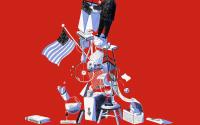Common Dreams/ Published on Wednesday, June 1, 2005 by CounterpunchDiana Johnstone
The French went ahead and did it. Despite being lectured by government and party leaders, media pundits and foreign leaders flown in from neighboring countries, all telling them that they must vote "yes" to the Treaty establishing a Constitution for the European Union or the sky would fall, a solid majority of 55% voted "no"! The high turnout of 70% gave the rejection indisputable credibility.
This was essentially a vote against dogmatic free market policies, and the type of economic globalization being pursued by the "neo-liberal" free marketeers.
The "non" was resounding, and, for those who were listening, the message was clear. But who was really listening?
The day after the vote, mainstream politicians and media were all scurrying to misinterpret the event to suit their own repudiated agendas. No wonder, because the referendum result amounted to an extraordinary rejection not only of a bad text, but also of the whole political class -- newspaper and television commentators included -- who had zealously resorted to every possible exhortation, deception and threat to sell the "oui" vote.
And it was not only the ardent salesmanship of the familiar faces on the screen that was rejected. The "non" was also an expression of exasperation with the whole lot of mainstream politicians and media stars, the "oui-ouistes" as they were dubbed, for years of preening self-satisfaction and unfulfilled promises as more and more businesses shut down leaving employees out in the cold. Part of the satisfaction of voting "non" was to watch television and see the consternation on all those familiar faces, and listen to each one's frantic attempts to blame the others for the disaster in hopes of salvaging his or her own political career. This was a highly amusing spectacle, but also extremely disturbing. Because although the meaning of the vote was clearly a desire to throw all the rascals out, they are still there. They are still there in the media especially, where they need not fear losing the next election. They are there to interpret events as it suits them, not least to the rest of Europe and the world.
The interpretations of the French vote making the rounds display an unshakable determination not to understand what happened.
Of course, all the stale, ignorant clichés about "the French" are being trotted out. Typically, to explain the French psychology, the International Herald Tribune quoted a Polish human resources consultant on a Warsaw parkbench, who opined that "France still has nostalgia for its empire". No doubt people all over Europe and in the United States could come up with the same absurdity, because that's what their media tell them.
That being the case, let it be observed that France's "nostalgia for empire" is a fantasy, especially current among certain imperialist Americans who cannot conceive of any lesser national ambition. There has been no significant nostalgia for empire in France since President de Gaulle decided over forty years ago that it was in France's best interest to withdraw from its colonies. In any case, that has absolutely nothing whatever to do with the May 29 vote. Exit polls showed that the number one motive for the "no" vote -- 56% of respondants -- was the state of the economy. This means unemployment. Because in terms of business profits, the French economy is not doing so badly, thank you. But ten percent official unemployment, as profitable firms shut down plant to move to countries with cheaper labor, is considered intolerable.
The second motive indicated, with 46%, was the "neo-liberal" nature of the Constitution treaty. The third most frequently mentioned motive was the desire to have the Constitution renegotiated.
These data show clearly that the vote was not "against Europe". Of course, there were bound to be contradictory motives behind the no vote -- and behind the yes vote as well. The far right National Front voted "no" to the European Union, which will surely be the choice of an even larger segment in the United Kingdom, if the UK referendum takes place. But the bulk of the French "non" was pro-European and anti-globalization. If anything, it was for a stronger Europe more inclined and able to resist the destruction thrust of globalization and to protect social and environmental standards.
On the right, voters wanted to preserve national sovereignty. There is nothing really so dreadful about that. But most of the "no" vote came from the left. Despite increasingly frantic efforts by their party leaders to shore up the "yes" vote, a large majority of Socialists (59%) and an overwhelming majority of Greens voted "no". The current leaders of those parties are in for a rough time. Socialist Party leader François Hollande is perhaps the major casualty, with his main rival, Laurent Fabius, who prudently endorsed the "non", waiting politely in the wings to take over the shattered party.
The party leader who comes out of this test with flying colors is Marie-George Buffet, who may have succeeded in saving the French Communist Party from total oblivion by cutting loose from the Socialist Party while at the same time abandoning all past sectarianism in favor of a unitary campaign with the whole rejectionist spectrum from the center to the left, includingTrotskyists, dissident Socialists and Greens. An eventual left coalition with Laurent Fabius can be imagined.
Meanwhile, the Eurocrats who were warning of a cataclysm in case the French voted the wrong way, are trying to pretend that nothing has happened. The particularly unattractive Portuguese head of the European Commission, Jose Manuel Barroso, and the current Luxembourgeois head of the European Council, Jean-Claude Juncker, announced blandly that the ratification process will go ahead as planned in spite of this "accident de parcours" -- a chance mishap, like a flat tire to be repaired before continuing in the same direction. However, legally, the Constitution cannot go into effect unless it is ratified by all 25 member States. Rather than recognize that the French have killed this text, and demanded a better one, the Eurocrats sputter that it's not fair for one country to decide for all the others. But one reason people voted against the proposed Constitution was precisely that it required unanimity for amendment, meaning any country could decide no for all the others.
Wednesday the Dutch will vote. Their no will probably have a somewhat different coloration than the French, but so what? There is in fact an emerging clash between the sort of "European construction" pursued over the heads of Europe's people and democracy. If "Europe" can't be constructed democratically, should it be constructed at all?
The biggest question mark is Germany, where the left is already in political crisis because of the drastic anti-social economic reforms pursued relentlessly by the "pink and green" government of Gerhard Schroeder. The Social Democratic Party (SPD) was just voted out of office in its last major stronghold, North Rhine Westphalia. Oskar Lafontaine, who left the leadership of the SPD years ago in disagreement over Schroeder's turn to neoliberalism, has now officially left the SPD and is working to create a new more progressive party. At a "non de gauche" rally on the eve of the French vote, Lafontaine was given a huge, overwhelming ovation that obviously left him deeply moved. The revival of the French left around the referendum has encouraged Lafontaine to try to revive the German left. While mainstream Germans converged on Paris condescendingly lecturing people who knew more about the Treaty than they did, Lafontaine is one German who understands perfectly what this vote was all about. And there are more. The crucial task for the future of Europe will depend on cooperation between the French and German left in explaining the meaning of the French rejection to the Germans and in inspiring a new common political course.
President Chirac warned that France would be the "black sheep" of Europe if it refused to ratify the Constitution. Significantly, Germany ratified the Constitution by an overwhelming vote -- of the Bundestag. If French ratification had been up to the National Assembly, the "yes" vote would have been just as overwhelming. The German Constitution bans popular referendums. But one can imagine that a popular referendum in Germany might have produced exactly the same result: at first, polls would have shown a majority in favor, but little by little, as people examined and discussed the actual text, opinion would have shifted. After all, the economic situation in Germany is even quite a bit worse than in France. The reasons to reject free market dogma are equally valid in both countries.
For this to be realized, trade unionists and political activists have to overcome the obstacle of chronic media misrepresentation. For this, they have a new weapon, which already played a significant role in the campaign for the "non" -- the web.
Diana Johnson is the author of Fools' Crusade: Yugoslavia, Nato, and Western Delusions published by Monthly Review Press.






